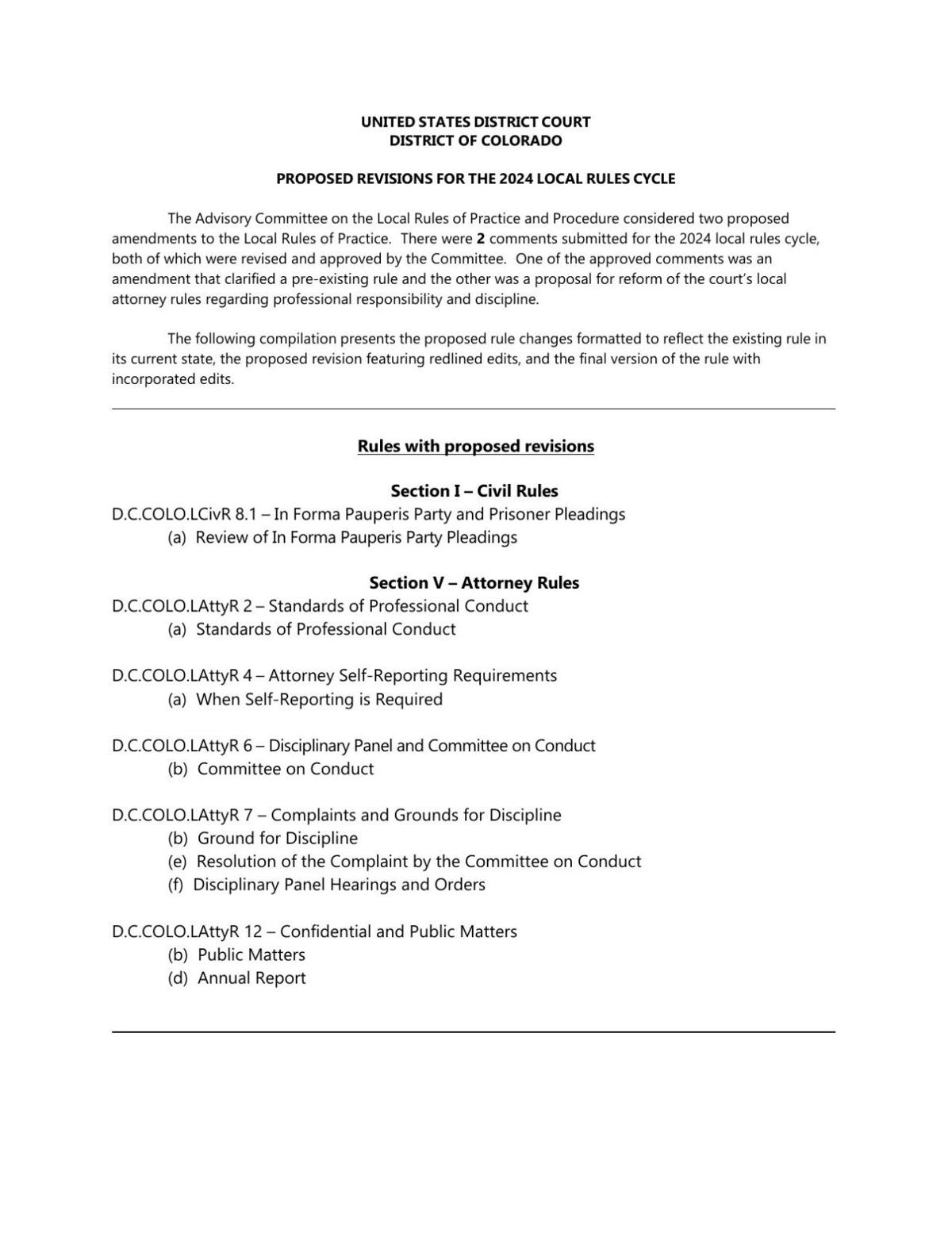Colorado’s federal trial court contemplates letting judges set own rules for attorney misconduct
Colorado’s federal trial court is contemplating multiple changes to its rules governing attorney misconduct, including by allowing individual judges to set their own courtroom-by-courtroom standards that could serve as grounds for discipline.
Like its counterparts nationwide, Colorado’s U.S. District Court sets forth a lengthy list of local rules governing topics as diverse as case assignments, criminal pleas and communications with judges. In addition, each district judge and magistrate judge has practice standards addressing their individual courtroom procedures.
But a proposal currently under consideration would give judges the power to set out their own rules of professional conduct for their courtrooms and initiate disciplinary proceedings against lawyers who do not comply.
“I do not agree that a violation of a judge’s practice standards should be grounds for attorney discipline,” said attorney Alan D. Schindler. “Such violations can and should be dealt with by the judge in question, who already enjoys considerable discretion in issuing sanctions against the violating party. Attorney discipline should be reserved for strictly violations of the rules of professional conduct.”
The summary of the changes posted to the court’s website indicates only that a district judge submitted the idea, without naming him or her.
Jeffrey P. Colwell, the court’s clerk, declined to share details about the origin of the proposal.
“Judges have the ability to identify conduct in their practice standards and orders that attorneys should adhere to and to impose consequences if they do not comply. This is not new, but the proposed rule makes it explicit regarding professional conduct,” he said.
Some practitioners were neutral on the possibility that judges may initiate disciplinary proceedings for violations of their own rules.
“All attorneys must follow the rules of professional conduct. If a judge imposes additional standards in their courtrooms, it is incumbent on an attorney to abide by those standards as well,” said attorney Matthew Cron.
Other lawyers warned a judge-by-judge patchwork is unnecessary and concerning, given the professional rules issued by the American Bar Association and the state-based adaptations of that template.
“Court practice standards, while important for the efficient conduct of business before the court, operate to manage procedural conduct before the court. Courts should and do have ample authority to enforce those practice standards through sanctions,” said attorney Gordon L. Vaughan. “Permitting a single judicial officer to convert practice standards into ethical rules overrides the extensive work of the ABA and each state in adoption of the rules of professional conduct.”
Colorado Politics examined the local rules of the district courts that, like Colorado, fall within the jurisdiction of the U.S. Court of Appeals for the 10th Circuit. None contained the language proposed for Colorado’s court.

Unlike the state judiciary, which has an attorney regulation office and a disciplinary judge, the federal court’s Committee on Conduct consists of volunteers who look into reports of misconduct.
“The biggest one is truth telling and following judges’ orders, and making sure you properly go through the mechanism of discovery,” Brooke Meyer, a former committee member, said during a courthouse presentation last year.
The court’s website contains a list of attorneys who have been subject to discipline. In a recent high-profile matter, the court disbarred L. Lin Wood, a supporter of former President Donald Trump who spoke favorably of the Jan. 6, 2021 attack on the U.S. Capitol, based on the outcome of his misconduct proceedings elsewhere.
Colorado’s federal judges have mentioned on occasion that they encounter more problems with the conduct of out-of-state attorneys. This month, U.S. District Court Senior Judge Christine M. Arguello told a group of Colorado lawyers that she takes issue with non-local attorneys who “think they can steamroll over anybody.”
The court’s local rules impose sanctions of censure, suspension or disbarment for misconduct, in addition to private letters of reprimand.
Schindler, the attorney who is concerned about permitting judges to impose their own grounds for discipline, said it is conceivable an attorney’s repeated violations of courtroom standards could rise to a professional transgression.
“Violating a page limit, or using the wrong font, should not subject a lawyer to discipline,” he said. “In other words, some violations are more serious than others, and so yes I am concerned about a blanket rule that says violations of a court’s practice standards equals a violation of the rules of professional conduct subjecting a lawyer to discipline.”
Other proposed revisions to the district court’s local rules include lowering the evidentiary threshold to discipline a lawyer and permitting lawyers who are not licensed in Colorado to serve on the Committee on Conduct.
“There are many talented practitioners who practice exclusively in federal courts, and the proposed change expands the Committee’s ability to seek talented and dedicated Committee members,” said Meyer, the former committee member who deemed the change reasonable.
The court’s public comment period on the proposal closed on Oct. 25. The active and semi-retired senior district judges will vote on the rules revisions.












